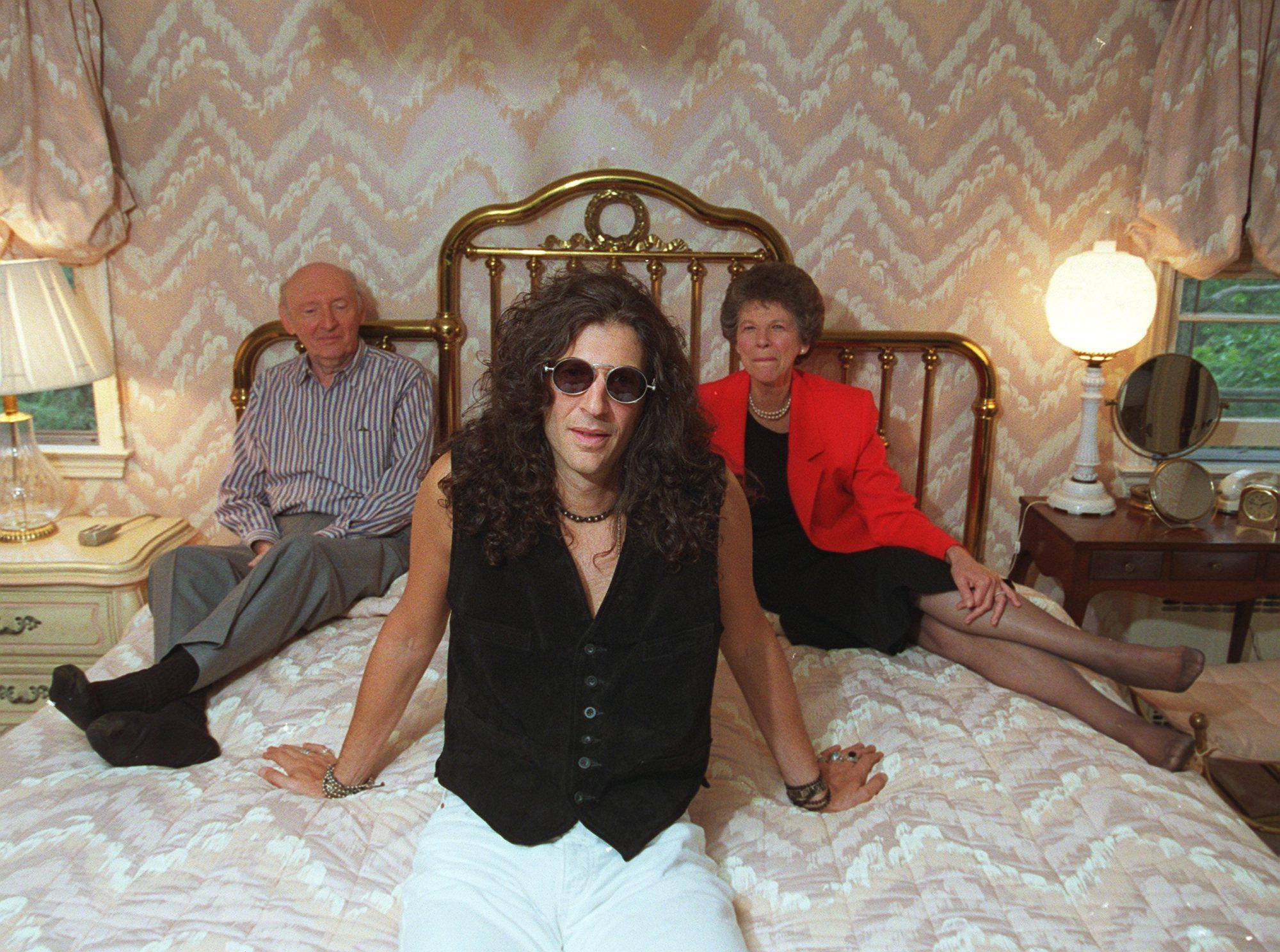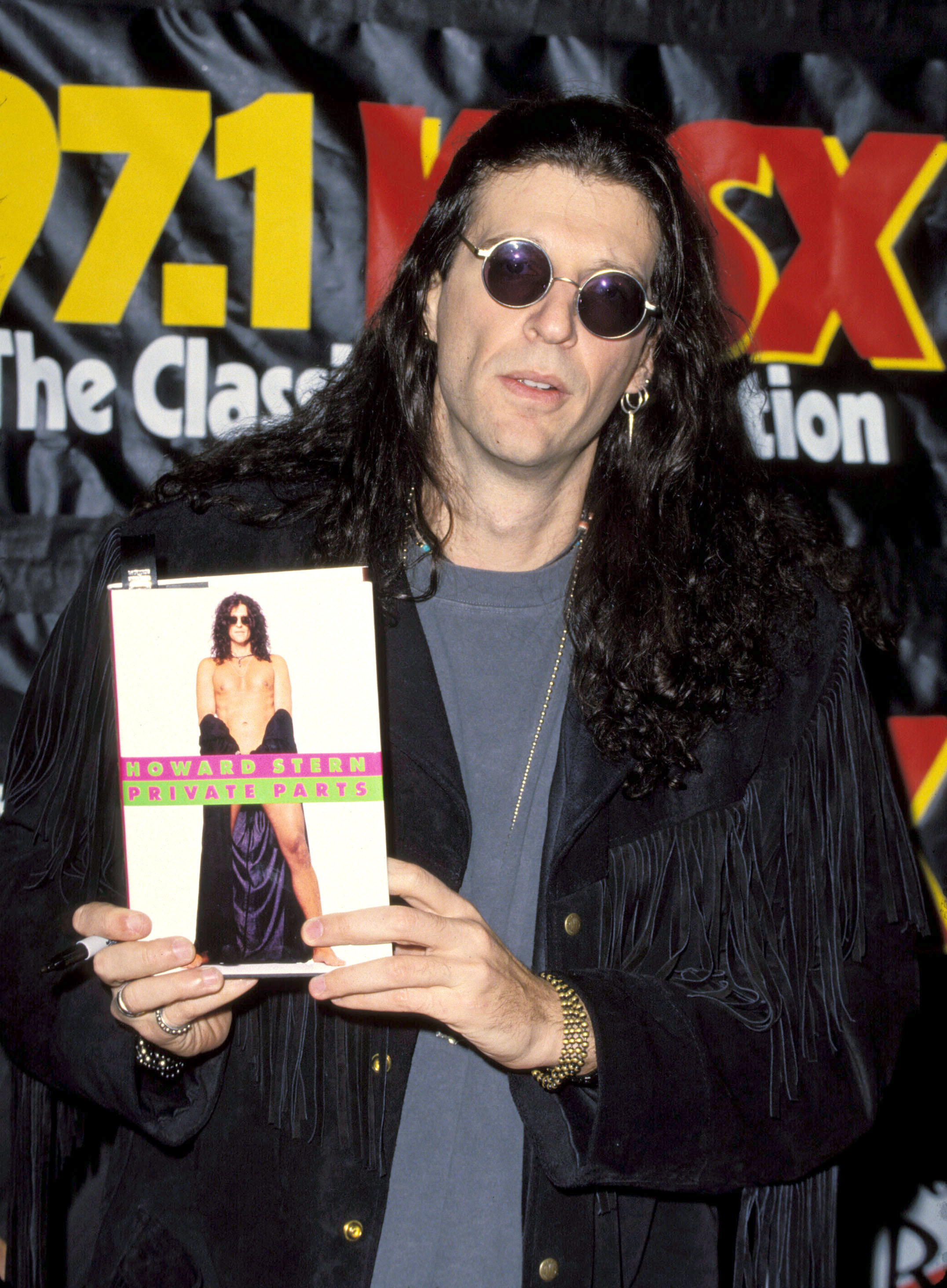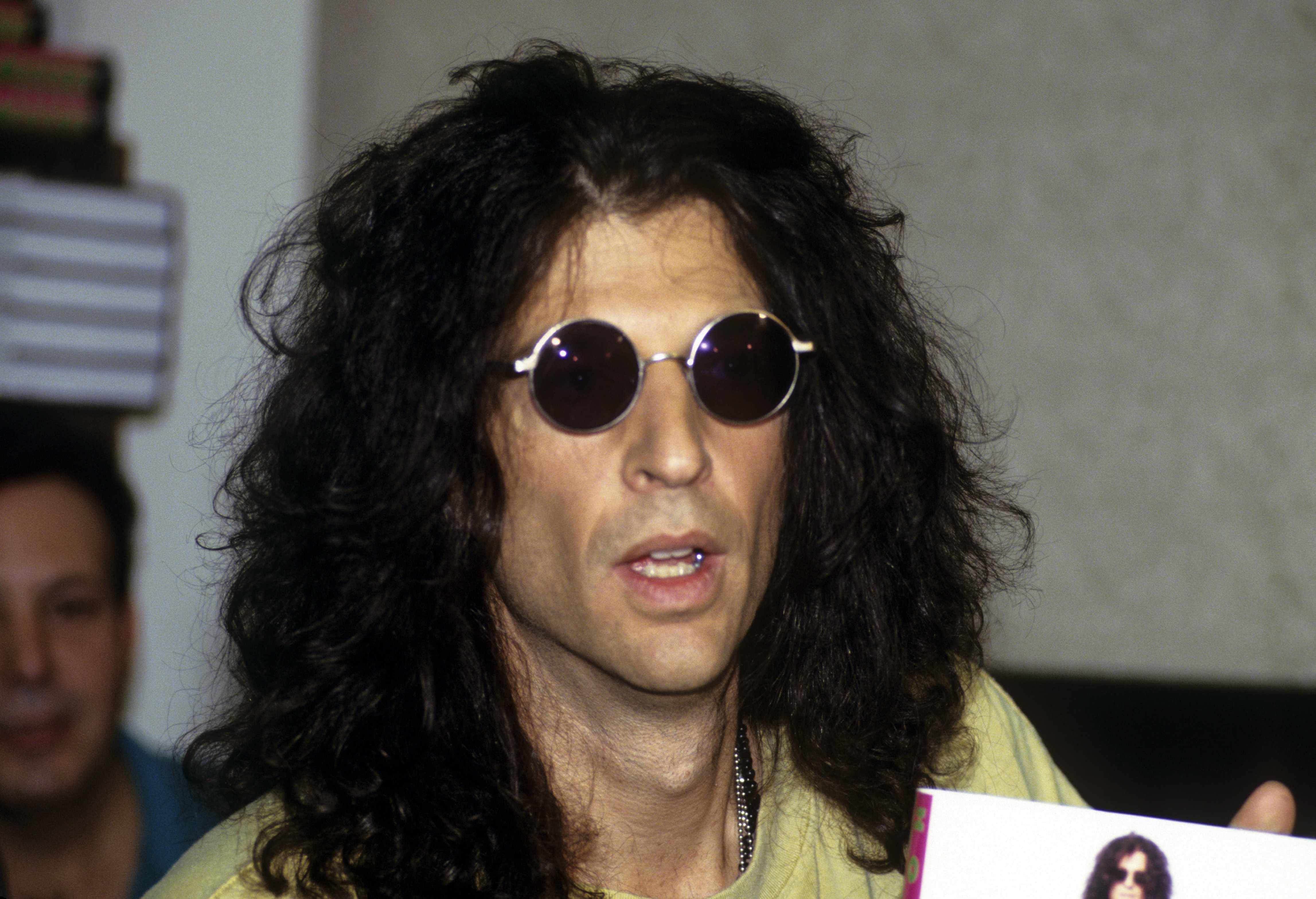This article originally appeared in the November 1993 issue of SPIN.
On Long Island, where I live, Howard Stern is God. Lord and master of the airwaves, ruler of the turnpikes and expressways. All my friends are obsessive Howard fans, fanatics who listen to his radio show, watch him on cable, collect all his tapes and videos. They know every detail of his life, the lives of his extended family, his staff, and their extended families. So what was I supposed to ask Howard Stern? What don’t we already know about this self-described megalomaniac? This lunatic who sacrifices his personal life to our public domain, every day, five days a week, four to five hours a day and then some?
Plenty. In honor of the publication of his autobiography, Howard Stern’s Private Parts (Simon & Schuster), I’m able to expose Howard Stern for what he really is: an incredibly sweet man, with a serious moral code and a strong sense of social responsibility. He even consoled me in my misery over an ex-boyfriend.
No one has pushed the populist critique harder than the king of shock-jock radio. Some of the same fools who have tried to gag your bands, ban your ‘zines, and gut your TV programs now want to seize Stern’s airwaves. Yet the man who claims to be “hung like a raisin” won’t back down.
SPIN: When I told my friends that I was going to interview you, they said, what can you ask somebody who tells everybody everything all the time? But you’re like everybody I know: We look fucked up, people think we’re drug addicts and whores, and meanwhile they don’t know we’re good sons and daughters, we never cheat. I love that you’re reversing the order of it. It’s like the thing in the book that you call the secret of life.
Howard Stern: Yeah, well, everyone seems so discontented with their life, and there’s so much class struggle in this country, everyone is jealous of anybody they think is doing better than them. We’re so materialistic that if someone says, hey, that guy is doing good, he can’t wait to see him fall on his fucking face. To me, the secret of life is just to sort of zone in on your own happiness. I used to go see those stupid Ingmar Bergman movies when I was in college, and the guy would say, “The secret of life is strawberries and cream,” and I’d say, fuck him, you know? But in a way all it really is, is that a guy gets up in the morning, and if he’s going to work, just go to work, accept it, eat a nice breakfast, enjoy that, get into the food, come home, fuck your wife, say hi to your kids, watch a little TV, go to sleep, do the whole fucking routine over again. On the weekend let loose a little bit, take a few drinks if you have to, enjoy movies, whatever. That’s life, that’s just it, there’s no other purpose to life than to just sort of have this regular routine, and stay the fuck out of trouble. But nobody’ll ever do that.
The most serious thing for me in the book, because I’m concerned with youth and family issues, is “Sit down, shut up, you moron.” You’re quoting your father, who said this to you since you were a little kid. You describe a dysfunctional family, which to me sounds normal by American standards: your overprotective mom, Ray, who locked you up like a veal calf, and your dad.
I’m one of those people who used to always scream that my father didn’t handle me right. My mother used to always call in the radio show and go, “That’s not true, it’s not like that.” My father had a recording studio, so we used to go and record, and all of a sudden, I find all these old tapes of my father yelling at me: “Sit down, shut up, you idiot,” and it’s great, because my father goes, “Wow, I really did come off that way.” My father was very loving and everything, he just doesn’t realize how fucking strong he can come on. And when you’re a kid, you’re like, “Oh man, I’m a worthless piece of shit.”

And if your dad wasn’t enough, now you’ve got the FCC to contend with.
Well, I have an interesting situation. I mean, I have the United States government telling me that I’m disgusting and that I’m perverting America, and I just know that they’re wrong. I said this on the air the other day, that Hitler during World War II didn’t have me on the radio; Nazi Germany didn’t have sexual movies, they had all this repression, and look what the fuck this guy got Germany to do. We have Bosnia today, with the Serbs and the Croats and the Muslims killing each other and, you know, they don’t have Howard Stern on the radio. This whole era of repression, that somehow words can hurt kids and all this, is a lot of crap, and this is what the government wastes time with. I’ve got a real fucking mess on my hands.
I wrote this book Teenage Wasteland about these teen suicides in Bergenfield, New Jersey, and the main thing people were saying is that heavy metal killed these kids. And I said, you fuckheads, you PMRC, what do you want to do, you want to censor rock’n’roll, which is the only thing that gives kids any meaning in their lives? You don’t understand it, you don’t know anything about culture. Then they had those ridiculous heavy metal trials, like with Judas Priest, where they blame these poor kids’ deaths on rock’n’roll—
I can’t even get to trial. I’ve got five guys on the FCC who are saying I’m guilty without a trial. The way they judge me is by “community contemporary standards.” And I said if that’s the case, I live in a community where priests rape young boys, and people kill each other every day. If we were to go by community standards, I am probably the smallest problem there is in our society.
Your problem, too, is not only do you have our fabulous so-called Christian Right and those censorshippers, but you have the lefty PCers up your ass—
Yeah, I got everyone up my ass. I’m a little disappointed that more journalists haven’t come down harder on this whole issue. They simply want to ignore it. They have no idea that it’s a genuine First Amendment issue. I’m really disappointed that Clinton hasn’t done something to get these guys off the FCC and relieve the situation, as he did in terms of abortion and allowing gays in the military. I really do think it’s a fundamental issue.
Could you take a minute to tell everybody exactly what you were fined for.
Well, I don’t know—nobody knows, nobody can figure it out If you read the book, you’ll read some of the transcripts of stuff people found offensive. Like a guy came in and wanted to play the piano with his penis—that was evidently gonna destroy the moral fiber of this country, so I was reported for that. I’ve only been reported by two or three people, while at the same point millions of people enjoy the show, and they don’t complain about it. But I guess the complaints of two or three people can rule the country, they can bring entire radio stations to their knees.
I never wanted to be the First Amendment poster boy. When I got into radio, nobody did anything exciting, it was so fucking dull and boring. I got into radio for some guy driving in his car, to keep him entertained. It wasn’t about going out and breaking any boundaries. The thing I did as a kid was radio shows just like this. When I was in college I was doing a radio show like this. It’s always been my dream to do this radio show. I set my dreams very short, so that way I don’t fail. So I did the show, which seemed like a great idea and a nice way to make a living, and now it’s become this whole fucking cause. The government says, well, everything would be great in this country if we get Howard Stern off the radio. It’s just absurd. There’s such bad parenting in this country, and there’s so many people neglecting their kids, and there’s this whole new fucking mentality that, hey, I’ll just break up with my wife, you know, divorce myself from the family. That’s what’s fucking killing the country, no commitment to anything, but nobody wants to face that, they want to blame Howard Stern, or they want to blame SPIN magazine, or heavy metal music for the failures in their life. I’m just doing a radio show that I know causes no fucking problems. I would rather quit the radio than change. I really would, I would just quit.
Then you could write more books. Did you enjoy writing Private Parts?
No, I didn’t. It was very difficult because I’m used to talking on the radio, talking on TV, and I didn’t know if I could really pull this off. When I started out, I said no way am I writing anything autobiographical, I’m just gonna deal with my views on everything. But that’s impossible to do when you’re me, because all I do is talk about myself, that’s my whole fucking thing. So I started writing: about my family, about my wife, about my sex life. And it just all came together. I think people are really going to laugh when they read this book.

Yeah, I did. I had one day to read the whole thing and I did it, and I hate to read.
Me too. I’ve read three books my entire life. I read a lot of magazines, but I never read books. I wanted to get across a couple of points, but still make the thing humorous: all the shit about the FCC, all the shit about the wacky listeners, the hate phone calls, the hate mail. I wanted the book to sound like the radio show. The radio show is successful because it has a lot of honesty and also it’s real, it’s the way people talk. It’s not politically correct, because people are sick of that. They don’t want to spend 20 bucks, then read some politically correct Kathie Lee Gifford book, where she’s talking about this wonderful life with Giff. That’s all show-business phony bullshit. We skewer everyone, Roseanne and Tom, Arsenio and Chevy, just about everyone.
I get the feeling that Private Parts is going to piss off a lot of people.
I think it’s a lot more provocative than Jerry Seinfeld’s new book.
In your book you say that all these women on Long Island want to have sex with him and stuff. Is that true?
Women, I think, look at Jerry Seinfeld like this will be a rich guy who will marry them—like Jerry seems obtainable—but meanwhile Jerry’s going out with models. I know Jerry, and I thought it was real funny when he started dating a 17-year-old, and we wrote a song about it, and the lyrics are in the book. Jerry’s not talking to me anymore because of the song.
Who do you identify as your peers in comedy?
Well, first of all, I’m in a weird area of comedy. I’d say in the last two or three years people have started identifying me as a comedian, as opposed to just a disc jockey asshole. I’m not a stand-up comedian, I don’t get up on a stage and tell jokes. I never wanted to do that. I’ve done some live dates, but it’s not really what I do. I’m not a Seinfeld or a Jay Leno; they construct a joke. I admire what they do, it’s just it never interested me. But I’ve gone to comedy shows where people have said to me, hey, you make me laugh four hours a day. That’s more than any of these guys can do. You make me laugh on a daily basis. So I’ve always been more comfortable going on the air and saying what the fuck happened to me last night, and riffing off that. I just talk.
Did you have an audience when you were writing?
That was the hardest part about It. I mean, I wrote this book from the viewpoint that I know best what my audience likes. For some reason I seem to tap into what millions of people like; picture Giants Stadium filled seven times over, and that’s who’s listening to me in any given 15-minute period just in New York alone, not mentioning No. 1 in Los Angeles, Philadelphia, and all that. We’re playing to millions of people, and when I do the radio show, I’m really playing to my partner Robin Quivers and to myself and to what I find interesting.
I know that my attention span is that of a gnat, and that’s why I think I’m successful on the radio. I will not pick subjects that bore me, only shit that really flies for me, and evidently, I really seem to be tapping into a lot of people who feel the same way. When I wrote the book, the original draft on the FCC chapter was about five times longer than it is, and I just said, “I’m fucking bored, who gives a flying fuck about every little thing that I’m gonna point out about the FCC,” and I took it, and I boiled it down, and made it to what I thought would be really entertaining.
One chapter I really like In Private Parts is when you went to camp and college and were with these girls.
Yeah. Whole chapter on girls. Real sex life and imaginary sex life. I talk about my real sex life with my wife and the women, the pathetically few women that I got, and then I talk about what goes on on the radio, and how I supplement my sort of humdrum sex life with this wild on-air spanking and massaging and enema douches.
In the book you talk about how when you were younger you used to date women, and you’d fuck them and then you would dump them. But you were clearly not a cold-hearted exploiter, you just didn’t know how to deal with them.
I was immature. I would fuck someone, and then go, “Oh, am I supposed to be their boyfriend now?” But I didn’t know what the fuck I was doing. I didn’t do it out of malice. I was embarrassed for what I had done. I wish I could go back and apologize for half the shit I did in that book. I’m gonna send a free copy of the book to each girl I ever fucked.
I want to ask you about Long Island, because I live on Long Island like you do, and there’s all this stuff in the papers and on TV about Long Island Babylon. Big hair, the sleaze capital of the world, Amy and Joey, John Esposito and Satan. They’re making it like everybody hates it there, you know, with the passion crimes, the breast cancer, the traffic, no jobs—
I love crime and breast cancer, so I’m attracted to that kind of stuff. I grew up on Long Island, and I have a very bad sense of direction, so for me to go anywhere where I didn’t grow up…at least I kind of know Long Island. But I moved back to Long Island because my parents lived on Long Island, my sister lived on Long Island, so when I decided to have kids, I figured, hey, why shouldn’t there be a bunch of family around. It wasn’t a great love of Long Island, but I kind of feel comfortable there, it’s just home, I like it. The show is so popular on Long Island that one out of every four men driving to work is listening to my show. One out of every ten people on Long Island is listening to my show. That’s pretty mind-blowing. That means everyone on Long Island, practically, listens to the show. I’ll guarantee you that the most sales for Private Parts will go down there. Absolutely.
Also, in the book you really call out Hollywood for Its two-faced appropriation of social causes.
It’s the worst part of show business. It’s so phony, there’s something so sickeningly sweet about it. Even Spike Lee, with his hypocrisy about going to the Hollywood community and raising $30 million from Warner Bros. for Malcolm X, and then calling them white devils. There’s so much hypocrisy, and no one’s allowed to talk about it, because then the publicists get all upset and everyone’s creating an image like they’re the President of the United States. I just think It’s kind of funny to pierce that veil.
The whole thing I’ve noticed is it’s real biased. It’s like Beavis and Butt-Head could never be Black. They’d never pick on stupid Black kids. It’s hands off. But you can pick on dumb white working-class males, you know, guys from my neighborhood, you can make them out to be idiots.
Right. Well, every time I do material about black people, people say I’m racist, I go, no, I’m not. I’m not fucking racist. I just don’t feel uptight about making fun of everybody on the planet.
Do you have any remarks or suggestions for the SPIN readers, ’cause they’re our nation’s youth, our proud nation’s youth.
I don’t know, I don’t have any heavy message for the SPIN generation, other than, don’t layer your hair, grow it out straight. The great thing about me is I really don’t appear to have any agenda. I can’t figure out what my agenda is. Well, maybe everyday life Is enough of an agenda.
Well, maybe everyday life is an agenda enough.





